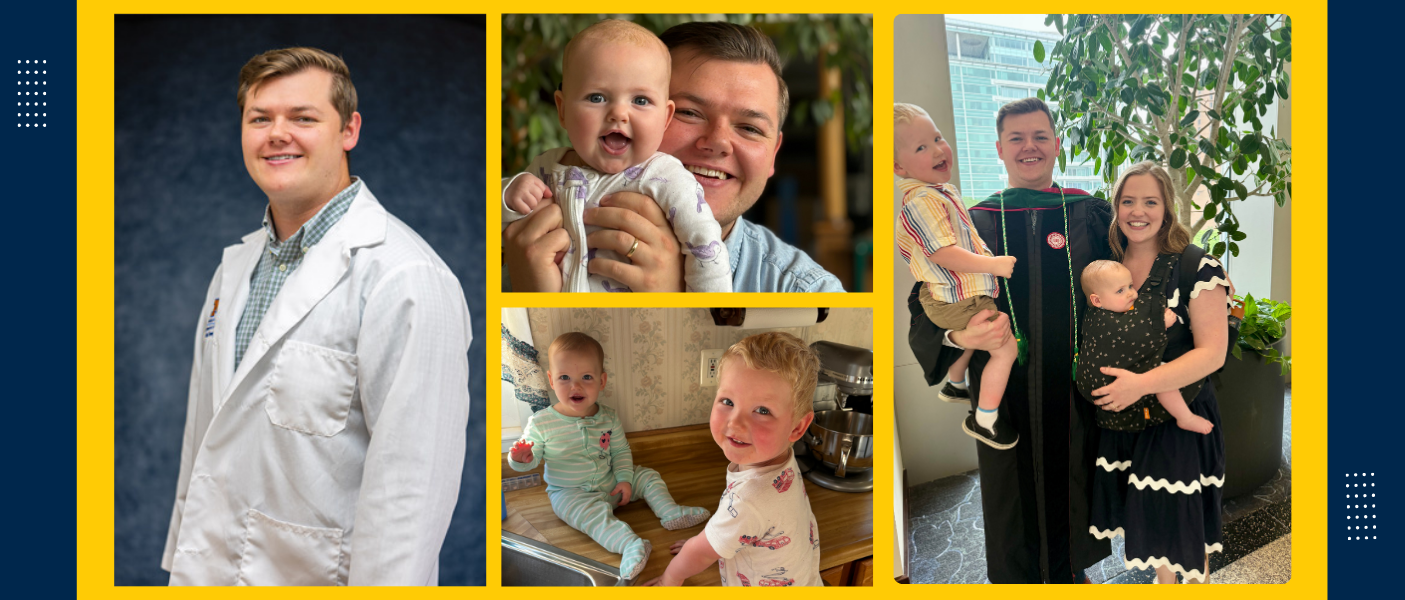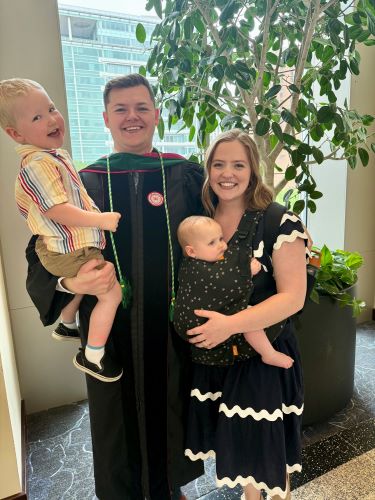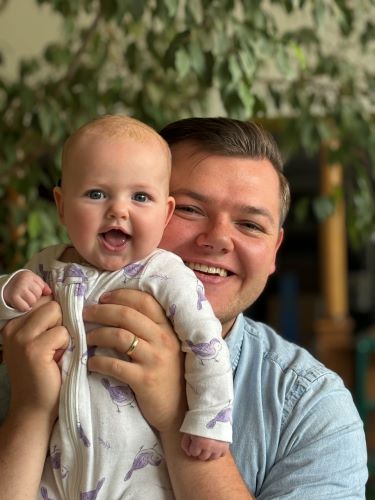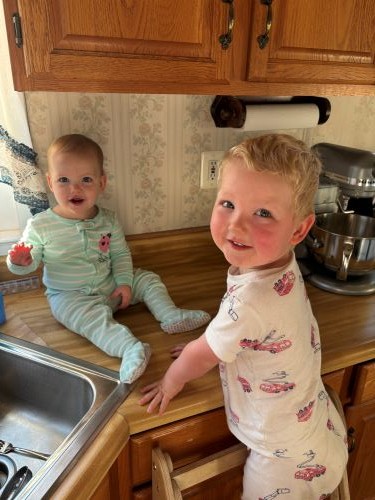

"Pathologists are truly the doctor’s doctor, and I love being a source of this critically important information for clinical colleagues."
I was born and raised in Fort Wayne, Indiana, where my dad managed a nearby farming co-op and my mom stayed at home. I have two sisters, one of whom is intellectually disabled; she’ll come live with me and my wife after residency. My other sister graduated from pharmacy school two days after I graduated from medical school. Growing up, my family prioritized education, church involvement, and music. Most of our time as a family was spent working in our garden, canning vegetables, or volunteering at church. There are no other physicians in my family, but many of my uncles and aunts are collegiate music professors. I attended Hillsdale College, a small liberal arts college in southeast Michigan, where I earned a degree in biology and studied classical voice extensively. I then returned to Indiana for medical school at Indiana University’s Fort Wayne campus.
medical school. Growing up, my family prioritized education, church involvement, and music. Most of our time as a family was spent working in our garden, canning vegetables, or volunteering at church. There are no other physicians in my family, but many of my uncles and aunts are collegiate music professors. I attended Hillsdale College, a small liberal arts college in southeast Michigan, where I earned a degree in biology and studied classical voice extensively. I then returned to Indiana for medical school at Indiana University’s Fort Wayne campus.
 What motivated you to pursue a medical career?
What motivated you to pursue a medical career?
I’ve wanted to be a physician since I was very young. I remember my father sitting me down at eight years old and firmly telling me that I needed to start thinking about my future career. I had an upcoming annual checkup and really liked my pediatrician, so I told my dad that I’d be a physician. Soon thereafter, I read a book on Phineas Gage, a 19th century railroad laborer who survived an iron rod shooting through his frontal lobe in a work accident. Reading this book was my first real indication that I actually liked science and could be happy pursuing medicine. As I got older, I continued to develop a profound love for all things related to biology and decided that a career in medicine would be a good use of my natural affinities and talents.
How did you decide on Pathology?
I went to medical school thinking I would be a rural family medicine doctor. I still think I would be very happy in that role, but I just fell in love with pathology in medical school. Since my very first lectures on histopathology, I’ve thought it was amazing that we can take tiny chunks of human beings, process them into ultra-thin slices, stain them a variety of colorful fluids, and classify patterns in the tissue to yield a diagnosis. Pathologists are truly the doctor’s doctor, and I love being a source of this critically important information for clinical colleagues.
I first considered a career in pathology after I met Dr. Rachel Mathis, an outstanding professor at my medical school. She trained as a pathologist, and she was absolutely excellent at explaining complicated disease processes to us medical students. I wanted to understand disease at the same depth she did, so I decided to look into pathology. I scheduled a short rotation with the pathology group in Fort Wayne and immediately knew that it was the right specialty for me. I liked that pathologists worked mostly alone but also frequently talked with colleagues and clinicians. I also knew that the extreme depth and breadth of knowledge possessed by pathologists would keep me intellectually engaged for my entire career. Finally, I knew that my wife and kids would appreciate the excellent hours of pathology compared to most specialties.
You ranked Michigan highly for the Match. What attracted you to our program?
Yes, it was my top choice! Several factors attracted me to the University of Michigan. First, Michigan has everything I need to achieve my career goals. The case volume and complexity here are among the very best in the world, the faculty are leaders in their fields, and the trainees are humble, hard-working, and extremely kind. I’m currently interested in pursuing either GI pathology or dermatopathology, and Michigan has excellent fellowships in both of these areas. Additionally, I did an away rotation here as a medical student, and I was blown away at the quality of the facilities. I got really into office chair ergonomics at the beginning of med school, and I’ve pioneered what I call the “office chair litmus test,” in which the quality of an employer’s office chairs serves as a surrogate marker for the workplace environment as a whole. Michigan passed my litmus test with flying colors.
Finally, my wife and I don’t prefer cities, and there are very few pathology programs that aren’t located in massive cities. Ann Arbor is the perfect location, not too big and not too small. My parents are just a few hours down the road, which makes it easy for them to see their grandkids. Plus, many of my good friends from college have settled down in the Ann Arbor/Ypsilanti area, so we’ve had a built-in social network since we moved here.
 Tell us about your time as a resident so far. Is there anything you would like to highlight?
Tell us about your time as a resident so far. Is there anything you would like to highlight?
It's only been a month, but I am loving residency. I was apprehensive to start residency with a month of clinical chemistry, which isn’t really taught in med school. My senior residents have patiently shown me the ropes and gotten me up to speed. The faculty have been outstanding; they always take the time to answer my questions and help me understand difficult cases. Although I’d already seen the department when I rotated here as a med student, I am still impressed at the culture of respect and the way education is prioritized.
What brings you the most joy in your work?
I love the way pathologists work “behind the scenes” to provide our clinical colleagues with vital information that informs nearly every aspect of patient management. Whether diagnosing cancers, culturing microbes, or running chemistry analyzers, pathologists are indispensable to many aspects of medicine. During my month on clinical chemistry, I received several pages from clinicians saying that a result didn’t make sense. I found it extremely rewarding to dive into the basic science of assay design, look over the patient history, come up with a list of possible explanations for the unexpected results, and discuss it with the clinician. Additionally, I have always been ravenously curious, and pathology allows me to learn new things every day. I find it very rewarding to leave work each day knowing that I’ve gained a new piece of knowledge that I’ll carry with me for my entire career.
In my personal life, my kids are the light of my life. I have a 2.5-year-old son and a 16-month-old daughter. I absolutely love being a dad. There is no better feeling than getting home each evening and having my kids rush to greet me. I’ve also found a lot of joy doing projects around our house. I’m pretty handy, so we bought a little fixer-upper with lots of accessible projects. I ripped out all the magenta and royal blue carpet (goodbye 70s) and sanded, stained, and finished the hardwood floors underneath. The following week, I stripped off the roof and put a new roof on with my college friends. I’ve skim coated several rooms of beat-up drywall, painted, and installed new trim. It’s nice to focus on something besides pathology and see our home become more beautiful in the process.
Are there any mentors you would like to mention? If so, how did they impact your life?
I would say my dad has been my biggest mentor. He is the hardest-working person I have ever met, and I’m grateful for all the time he’s invested in me. He’s also always modeled giving back to others. When my eighth-grade class was raising funds to visit Washington D.C., he immediately volunteered to grow several acres of pumpkins to sell at a roadside stand. We spent many, many hours planting, hoeing, and harvesting thousands of pumpkins. Additionally, for nearly 20 years, he’s mowed his church’s cemetery every week all summer long. He’s been the perfect role model of working hard for all the right reasons—his family and his community.
Another important mentor has been Dr. Tom McGovern, a Mohs surgeon in Fort Wayne who I met at church. Tom has become a good friend and source of great wisdom on balancing my career and family life. He was also the longtime host of the official podcast of the Catholic Medical Association, a resource that has been foundational to my development as a physician.
What is your strategy for finding balance between training and your other interests?
Finding balance between training and family life has been a challenge, but it’s much easier with a spouse as dedicated and patient as my wife, Clara. I think a major key to finding balance is to decide what your priorities are and stick to them. Clara and I choose to prioritize our family, our friends, and our faith. If we focus only on things in these categories, we can generally keep a schedule that maintains balance between my career and other aspects of life. I also find plenty of small ways to decompress away from work, whether it be walking to the park with the kids, singing in the church choir, or mowing the lawn. Finding joy in all these small, mundane things is really important to my sense of balance.
 What advice would you give medical students considering a career in pathology?
What advice would you give medical students considering a career in pathology?
Go see it for yourself! If you are at all curious about pathology, come over and get to know us. Pathology has a reputation for being extremely welcoming to learners. Not everyone is meant to sit at a desk looking through a microscope for the next forty years, but some of us are. The only way you can know if pathology is for you is to do some rotations. If you plan to apply to pathology residency, get involved early and get to know some pathologists so you can get letters of recommendation. The earlier you establish relationships with mentors in your field, the better. Also, go see an eye doctor. I hadn’t seen an optometrist in 20 years, but I made an appointment when I matched to pathology because I’d be a pretty useless pathologist if my eyes weren’t healthy.
What are some fun facts about you that we could share?
I’m an accomplished classical tenor and have sung much of the foundational tenor repertoire by Handel, Bach, Puccini, etc. I’ve sung for some neat people, including Pat Sajak and Supreme Court Justice Clarence Thomas.
My uncle was on Jeopardy when I was a kid. Turning my brain off and watching Jeopardy a few times a week was the only thing that got me through my third year of med school.
My jobs before residency include mowing lawns, working in a potting soil factory (for 70 hours a week!), and working for a junk removal company. Although these jobs serve as fun memories, I’m very, very happy to finally be a physician.
Welcome to Michigan, Gabe. We hope you enjoy it here, and we look forward to hearing you sing someday! In the meantime, enjoy this recording from a 2021 performance of Handel’s Messiah at Hillsdale College, where Gabe can be heard singing the opening recitative and aria from 4:34 to 10:20.